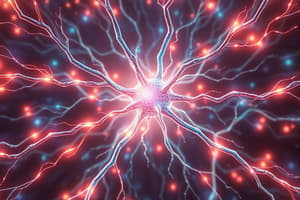Podcast
Questions and Answers
What is the role of acetylcholine (ACh)?
What is the role of acetylcholine (ACh)?
- A hormone
- A muscle protein
- A neurotransmitter (correct)
- A type of enzyme
What is an action potential?
What is an action potential?
A short-lasting electrical event in which the membrane potential of a cell rapidly rises above the threshold of excitation, then falls.
What does the adrenal cortex produce?
What does the adrenal cortex produce?
Steroid hormones including cortisol, aldosterone, and androgen.
What is the function of the adrenal gland?
What is the function of the adrenal gland?
What is produced by the adrenal medulla?
What is produced by the adrenal medulla?
What is adrenaline also known as?
What is adrenaline also known as?
What does 'adrenergic' refer to?
What does 'adrenergic' refer to?
What is an afferent neuron?
What is an afferent neuron?
What does the all-or-none principle state?
What does the all-or-none principle state?
What is an alpha motor neuron?
What is an alpha motor neuron?
What is an alpha receptor?
What is an alpha receptor?
What is antagonistic control?
What is antagonistic control?
What does atrophy refer to?
What does atrophy refer to?
What does the autonomic nervous system control?
What does the autonomic nervous system control?
What part of a neuron is responsible for transmitting impulses?
What part of a neuron is responsible for transmitting impulses?
What is the axon hillock?
What is the axon hillock?
What does the beta receptor do?
What does the beta receptor do?
What are catecholamines?
What are catecholamines?
What does the central nervous system (CNS) comprise?
What does the central nervous system (CNS) comprise?
What does cholinergic refer to?
What does cholinergic refer to?
What is a cholinergic receptor?
What is a cholinergic receptor?
What is contraction in muscle cells?
What is contraction in muscle cells?
What is the cytoplasm composed of?
What is the cytoplasm composed of?
What are dendrites?
What are dendrites?
Flashcards are hidden until you start studying
Study Notes
Neurotransmitters and Neurons
- Acetylcholine (ACh): A crucial neurotransmitter involved in somatic and autonomic nervous system signaling.
- Action Potential: A rapid electrical signal in excitable cells, crucial for communication and intracellular processes in muscle cells.
- Afferent Neuron: Specialized sensory neurons responsible for transmitting sensory information to the central nervous system.
- All-or-None Principle: Once a neuron's action potential threshold is reached, it fully propagates, affecting muscle twitches similarly.
Adrenal Gland Structure and Hormones
- Adrenal Gland: Also known as suprarenal glands, these endocrine structures produce hormones like cortisol, epinephrine, and norepinephrine.
- Adrenal Cortex: The outer layer, responsible for synthesizing steroid hormones such as cortisol and aldosterone.
- Adrenal Medulla: The inner layer that produces catecholamines, primarily epinephrine and norepinephrine, crucial for fight-or-flight responses.
- Adrenaline: Another name for epinephrine, mainly secreted by the adrenal medulla.
Types of Receptors and Control Mechanisms
- Alpha Receptor: An adrenergic receptor that induces vasoconstriction when activated by epinephrine or norepinephrine.
- Beta Receptor: An adrenergic receptor that can have varying effects on different tissues depending on subtype (Beta1, Beta2, Beta3).
- Cholinergic Receptor: Binds acetylcholine, including nicotinic and muscarinic types that mediate diverse physiological responses.
- Antagonistic Control: In autonomic nervous system regulation, organs receive both excitatory and inhibitory signals from sympathetic and parasympathetic divisions.
Muscle Physiology and Morphology
- Alpha Motor Neuron: A motor neuron innervating skeletal muscles, crucial for voluntary movement.
- Atrophy: Reduction in muscle cross-sectional area, typically due to inactivity or denervation.
- Contraction: Occurs through actin and myosin filament interaction, leading to muscle fiber tension.
Nervous System Basics
- Central Nervous System (CNS): Comprises the brain and spinal cord, responsible for processing sensory input and coordinating responses.
- Dendrites: Neuron extensions that receive signals from other cells and convey them to the cell body.
- Axon: A long projection from the neuron that transmits action potentials away from the cell body.
- Axon Hillock: The area where action potentials initiate, integrating synaptic inputs from the neuron’s dendrites.
Cellular Components and Function
- Cytoplasm: Consists of cytosol and organelles, serving as the site for major cellular activities like glycolysis.
- Adrenergic: Pertaining to the effects caused by catecholamines (epinephrine and norepinephrine).
- Cholinergic: Relates to the actions of acetylcholine within the nervous system.
Studying That Suits You
Use AI to generate personalized quizzes and flashcards to suit your learning preferences.




